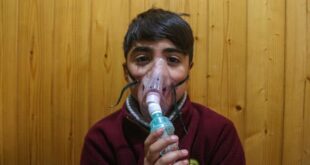A California company that makes baby neck floats has refused to recall the inflatable devices despite safety warnings from two federal agencies and a report of a baby drowning while using the product, Consumer Reports warned.
Since the Otteroo first appeared on the market, the Consumer Product Safety Commission (CPSC) has received 68 incident reports about the inflatable flotation ring designed for babies as young as three weeks. In all cases, the infants had to be rescued by their caregivers, Consumer Reports said. Although many of the infants in the CPSC’s incident reports had no lasting injuries, some required hospital visits, CPR or intubation, according to the consumer advocacy and media organization.
An Otteroo neck float helped lead to the drowning death of a 6-month-old infant in Maine three years ago after the child slipped through the neck hole of the device, the CPSC said. A 3-month-old was seriously injured in New York last year in a similar situation, the agency said.
Otteroo founder Tiffany Chiu said the products are safe with proper parental supervision, telling CBS MoneyWatch that infants can also slip out of other products, such as bath seats.
“In any situation in or near water, whether a child is using an Otteroo or not, the potential for accidents exists,” Chiu said. “It could be a child slipping out of a bath seat or even from a parent’s hands. It’s crucial to remember that the key to mitigating such risks is attentive, active supervision.”
Federal safety warning
The U.S. Food and Drug Administration last year advised parents not to use any neck float products, and the CPSC has issued a similar warning. The agencies, which cannot force Otteroo to recall its neck floats, note that the devices could deflate and start to potentially tighten around an infant’s neck, risking strangulation.
Otteroo.com
Chiu said any inflatable device that loses air can harm a child.
“We strongly disagree with CPSC’s statement that Otteroo is defectively designed because it could deflate due to a leak — this is indeed the inherent nature of all inflatables,” she told CBS MoneyWatch. “Unfortunately, CPSC has singled out Otteroo and ignored thousands of other inflatable children’s products on the market, and has imposed an unrealistic and impossible standard that our float should not carry the risk of deflation.”
Consumer Reports focused on Otteroo because it is the most popular brand of neck float and because of the company’s resistance to issuing a product recall, Oriene Shin, policy counsel for Consumer Reports, told CBS MoneyWatch.
Mambobaby, Swimava and other companies also make baby neck floats, but those manufacturers “don’t have the same brand recognition as her products has,” Shin added, referring to Chiu.
Shin noted that companies often decline to recall a product unless there is definitive proof it is potentially harmful. But that could be dangerous for companies that make baby products.
“That means they need to see more babies and children get injured and die, and that’s just unacceptable to me,” she said. “We can’t wait for additional data to hold companies accountable and keep babies safe.”
Baby neck floats started gaining in popularity several years ago, with photos of the pint-sized swim devices cropping up on social media, prompting one pediatrician to describe the products as “potential death traps” in multiple news accounts.
The neck floats are touted by manufacturers as a product that gives babies mobility, but the FDA said the effectiveness of the products has not been established. The agency said floats shouldn’t be used, particularly for babies with spina bifida, spinal muscular atrophy, Down syndrome or cerebral palsy.
 Latest Breaking News Online News Portal
Latest Breaking News Online News Portal






